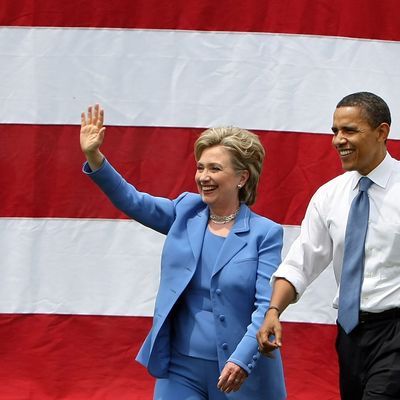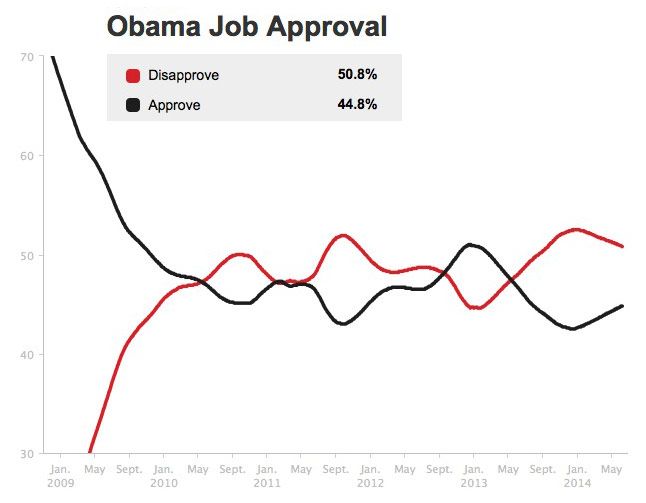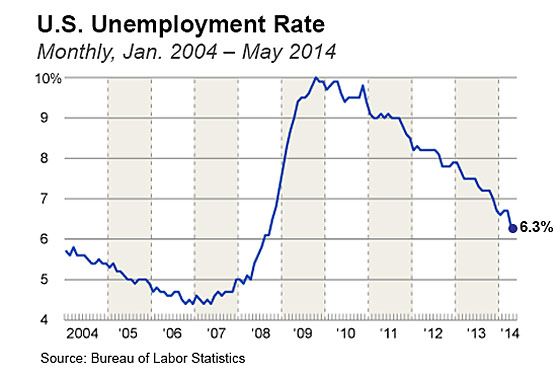
Almost exactly six years ago, when Hillary Clinton finally conceded the Democratic presidential nomination to Barack Obama, she bore the scars of years of partisan warfare that he had soared above. As Clinton unofficially embarks upon her second presidential campaign with the release of her book, the two figures have nearly reversed roles. Now Obama is a figure brought low by accumulated partisan controversy, and Clinton the relatively untainted outsider — and, hence, the vessel for her party’s hopes of renewal.
So completely has the narrative inverted that Clinton’s task is now seen as escaping Obama’s taint. Clinton “could use some separation given his anemic poll numbers,” reports Politico’s Maggie Haberman. In Sunday’s New York Times, Ross Douthat argues that Obama’s low approval ratings leave the Party bereft of any competitive basis at all save Clinton’s unique appeal — her “iconic status is, increasingly, the only clear advantage the Democratic Party has,” writes the conservative columnist.
Are Obama’s approval ratings actually likely to drag down Clinton’s prospects of winning in 2016? Not really. Here are four things to keep in mind about the public opinion landscape facing Clinton:
1. Obama’s approval is high enough to win already. Courtesy of HuffPost Pollster, here’s a chart of the president’s approval ratings:

He’s only at about 45 percent, which is also where Gallup has him. But that’s about the same level at which Obama found himself at the end of 2011. What happened then? Well, we had a campaign, and most voters clearly decided they preferred Obama to the Republican alternative.
2. The Republican Party remains in bad shape. The reason Obama handily won reelection despite middling approval ratings is that America hates the Republican Party. The Democrats have a net favorability rating of minus one, while the GOP’s is minus 24. What’s more, the electorate is deeply polarized, with very few swing voters, and generational replacement is slowly ratcheting up the proportion of Democrats. Whatever it is that’s making Douthat so chill about the GOP’s near-term electoral prospects, it’s not a cold look at public opinion.
3. The economy matters more than anything. It’s obviously a political science cliché, but the state of the economy will have more impact than anything else on the outcome of the next election. Points 1 and 2 above suggest that the Democrats have a strong enough natural majority right now that, if the economy is neither great nor terrible, they’re likely to win. If the economy falls into a second recession within the next two years, Republicans could probably win even if they nominate a Ted Cruz–Sarah Palin ticket.
But even in 2012, the economy had recovered well enough to permit Obama to win reelection. And the labor market continues to recover:

If this trajectory continues, Obama’s approval ratings, which have already recovered from their 2013 dip, will likely rise more. If it’s June of 2016 and the recovery has continued for two more years, the Democrats will have an easy case to keep their party in power. If it hasn’t, no nominee is likely to save them.
4. Clinton’s popularity is mostly a function of staying out of politics. Clinton has probably burnished her résumé by serving as secretary of state. But her approval ratings haven’t risen because Americans have intimately followed her diplomatic strategy in Burma and the Middle East. They’ve risen because she’s no longer representing partisan combat. That’s why first ladies are almost always popular (the only recent exception being Clinton herself, a problem she solved by removing herself from the partisan spotlight), and it’s why even hated former presidents like Jimmy Carter and George W. Bush recover their popularity.
But by definition, it’s not a strategy that can survive a presidential campaign. The project of transferring conservative rage back from Obama to Clinton has only just begun. If — or, more accurately, when — Clinton gains her party’s nomination, Republicans will forget all the things they learned to appreciate about her when Obama displaced her as the leader of the Democratic Party a half-dozen years ago. By this time in 2016, it is just as likely that Clinton will need to attach herself to Obama’s popularity as the other way around.
Update: Douthat has a reply, which elides the core of the point, namely, that Obama’s approval ratings simply aren’t low at all, if you define “low” to mean “not high enough to win a presidential election.” Nate Cohn rebuts Douthat more thoroughly here. Cohn’s main point is that Obama’s approval ratings are misleading artifact, and a large chunk of the Democrats registering disapproval for him would readily support him if he were on the ballot again.






























